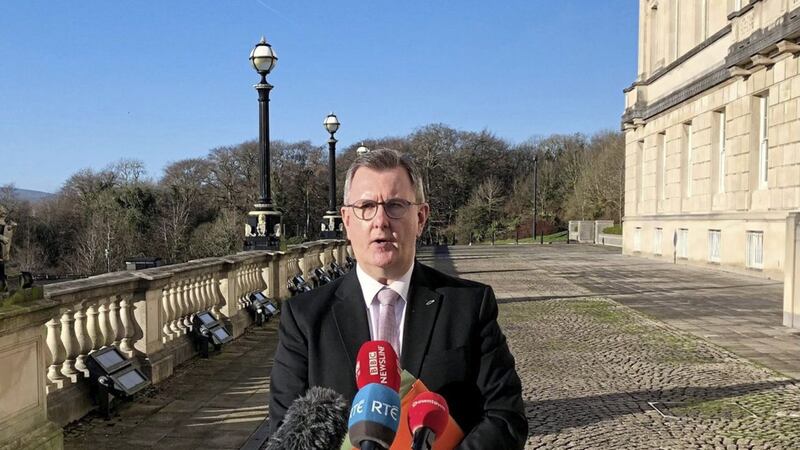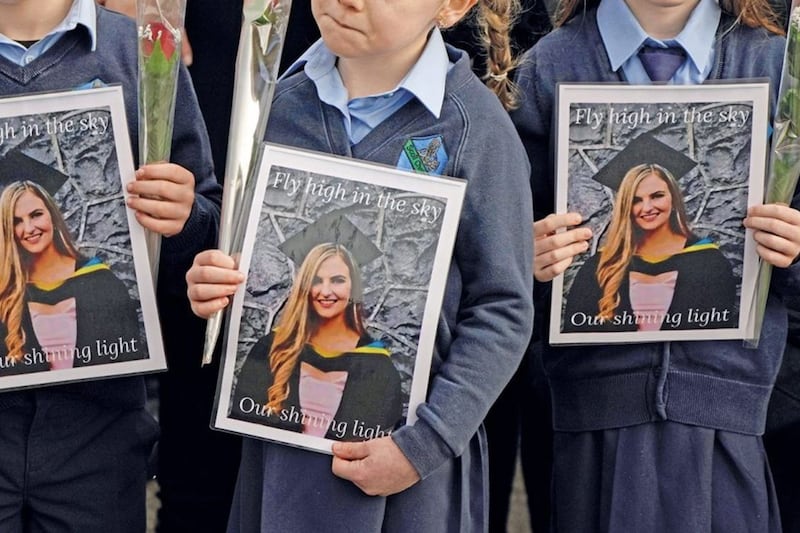The crucial question about the reintroduction of double jobbing is to what extent the government and the DUP planned it for the convenience of Jeffrey Donaldson.
In fairness to the DUP leader, everything on the record points to a gift falling into his lap. All the main UK and Northern Ireland parties at Westminster had been musing on reintroduction since before he became leader. However, it is hard to see who else’s convenience they had in mind.
The first reference in the Commons to these musings was last June, by Labour’s shadow Northern Ireland secretary Louise Haigh.
During a debate on a Stormont reform bill, which will enact changes in New Decade, New Approach, Haigh began by congratulating Donaldson on his appointment as DUP leader and ended with: “we hope to see some movement from the government on dual mandates to allow for greater flexibility, potentially on a short-term basis.”
Flexibility on moving between Westminster and Stormont is the reason everyone has cited for reintroduction. Nobody advocates a full return of double jobbing, only a limited ability to hold two offices for long enough to avoid by-elections.
In a Lords debate on the same bill in December, an amendment was proposed by Liberal Democrat peer and former Alliance leader John Alderdice. He said the outright ban on double jobbing makes it difficult to move between Westminster, Stormont and the Dail, depriving Northern Ireland of “experienced legislators” and causing politics to become “siloed”.
His concerns were shared by peers from the DUP and SDLP and by David Trimble, who sits for the Conservatives. There is rich irony in Trimble helping Donaldson become first minister after their epic feud over power-sharing two decades ago.
While this debate may have begun before Donaldson became leader, rumours of him hoping to succeed Arlene Foster began in late 2018, immediately raising the difficulty of returning to Stormont.
If people at Westminster were not thinking of how to help Donaldson, perhaps it is more accurate to say they were thinking of how to replace Foster - a problem that troubled Northern Ireland politics until the middle of last year.
Lord Alderdice also expressed a wish to bring Stormont into line the rest of the UK.
Scotland has full double jobbing, with no serious calls to scrap it.
Wales permits assembly members to be MPs for up to a year but only to avoid an assembly by-election. If an MP is elected to the Welsh assembly there must still be a Westminster by-election, which would be no use to Donaldson in Lagan Valley.
In any case, Stormont does not have by-elections; replacement MLAs are co-opted.
So Alderdice’s amendment was a bit of a mess. The government asked him to withdraw it and came up with a version of its own, where MPs elected to Stormont can hold both offices until the next general election, avoiding a Westminster by-election.
This was less of a mess, although it does not address co-option, meaning a party could run multiple MPs for Stormont then replace any elected.
The UUP says “the timing stinks” but everyone is implicated in that as well. Every party attached double jobbing to the Stormont reform bill and demanded it be passed before May’s election.
What does stink is the government’s uncharacteristic haste in proposing its own amendment. It clearly found a gift to Donaldson convenient.
TUV leader Jim Allister is among those to ask what the DUP offered in return, with acceptance of the protocol a common suspicion. However, that would not require a conspiracy. The DUP’s only real option is to put a brave face on almost any deal London and Brussels can reach. Certainly, that has always appeared to be Donaldson’s plan. As a deal will have to be sold to unionist voters and the DUP is likely to remain the largest unionist party, the government has presumably judged Donaldson to be the best person for the job and decided it is in everyone’s interests to remove an obstacle from his path.
The DUP was openly delighted, gloating that other parties were “asleep at the wheel”. The media should have spotted Haigh’s June statement: in my own defence, I can only say it is hard enough keeping track of this stuff with just one job.
But the government, the DUP and peers from other parties should have foreseen that even a limited return of double jobbing and the mere suspicion of ‘jeffreymandering’ would backfire with the electorate.
Now that has led to the amendment being withdrawn, an upset electorate is the only gift Donaldson has received.









